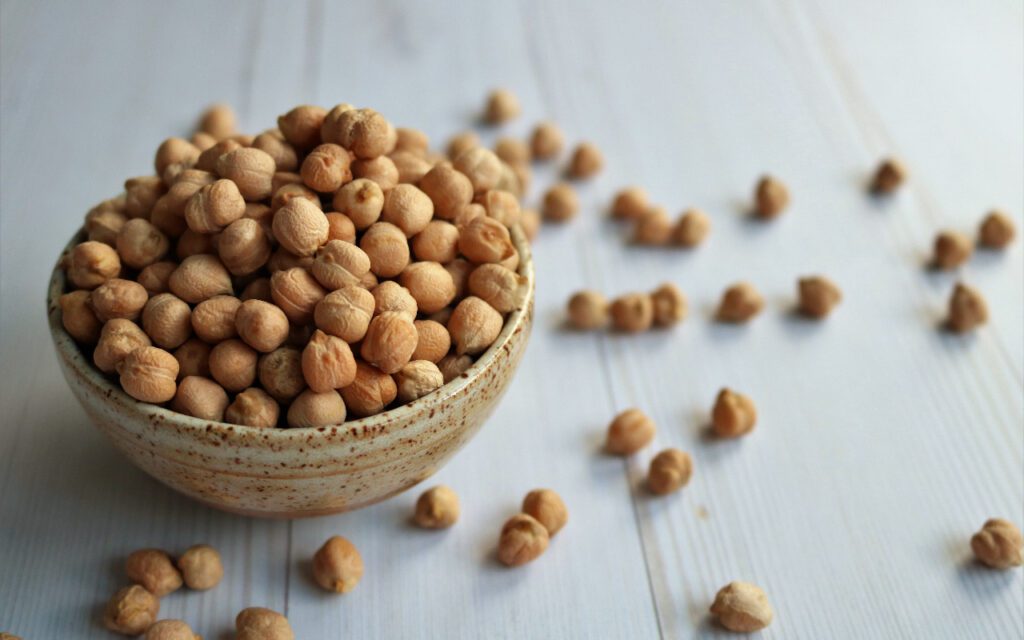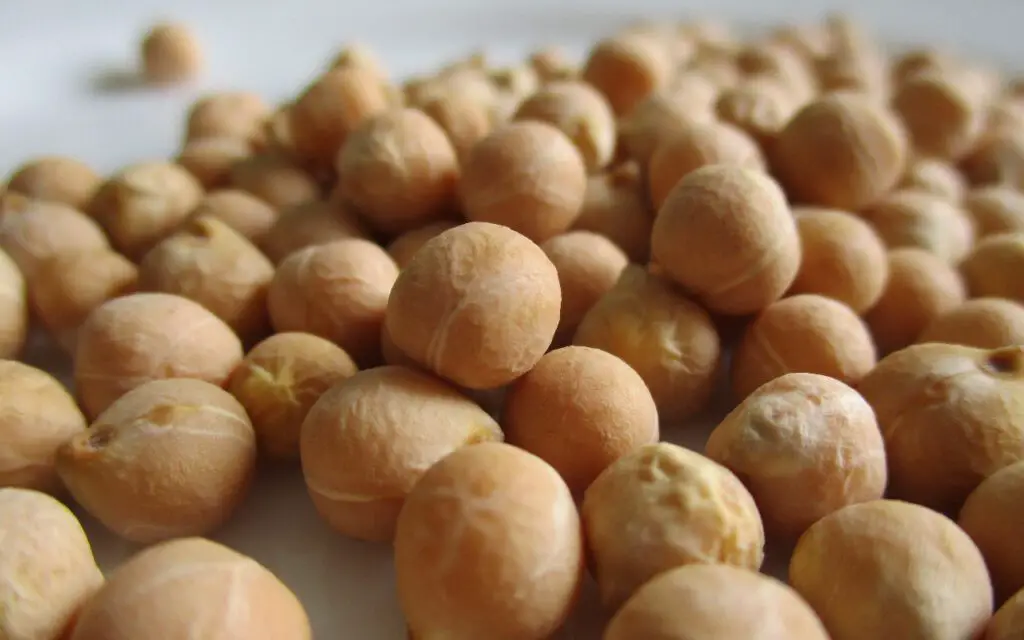As a veterinarian, one of the most common questions I receive from pet owners is whether their dogs can eat certain human foods.
Chickpeas, a type of legume, are increasingly popular in human diets, but many dog owners remain unsure about whether or not this food is safe for their furry companions.
In short, the answer is yes, dogs can eat chickpeas, but as with any food, there are potential risks and benefits to consider.
In this article, we’ll take a closer look at this nutrient-rich legume, explore its potential health benefits and risks, and help you determine whether chickpeas are a good addition to your dog’s diet.
- Can Dogs Eat Chickpeas?
- How Many Chickpeas Can Dogs Eat?
- How Often Can Dogs Eat Chickpeas
- Health Benefits of Chickpeas To Dogs
- Potential Risks of Feeding Chickpeas To Dogs
- Nutritional Benefits of Chickpeas For Dogs
- Are Dogs Sensitive To Chickpeas?
- How To Prepare Chickpeas For Dogs
- How Fast Will Dogs Digest Chickpeas?
- FAQs
- In Conclusion
Can Dogs Eat Chickpeas?

Yes, dogs can eat cooked and canned chickpeas, in moderation and with certain precautions.
Chickpeas are a great source of plant-based protein, fiber, and other essential vitamins and minerals.
They are also low in fat, making them a healthy addition to your dog’s diet. However, it is important to note that some dogs may have difficulty digesting chickpeas, which can lead to gas or bloating.
Additionally, chickpeas should never be a replacement for your dog’s regular meals, and any added seasonings or ingredients (such as garlic or onions) should be avoided as they are toxic to dogs.
Always consult with your veterinarian before making any changes to your dog’s diet, including incorporating chickpeas.
See also: 47 Safe Vegetables To Feed Your Dog. Puppy Power!
How Many Chickpeas Can Dogs Eat?

The exact amount of chickpeas that dogs can consume varies depending on their age, weight, and overall health.
However, as a general guideline, you can feed your dog small amounts of chickpeas as a treat or as a topper for their regular meals.
It is recommended to start with a small quantity, such as a tablespoon or less, to see how your dog reacts to the legume before offering more.
Additionally, it’s important to keep in mind that chickpeas should not make up a significant portion of your dog’s diet, and you should always consult with your veterinarian to determine the appropriate amount based on your dog’s specific needs.
Chickpeas Feeding Chart According To Size
| Food | Size | Portion |
|---|---|---|
| Chickpeas | Toy dogs | one tablespoon |
| Chickpeas | Small dogs | one tablespoon |
| Chickpeas | Medium dogs | 2-3 tablespoons |
| Chickpeas | Large Dogs | 2-3 tablespoons |
Chickpeas Feeding Chart According To Age
| Food | Age | Portion |
|---|---|---|
| Chickpeas | 0 – 6 months | Don’t feed |
| Chickpeas | 6 – 12 months | one tablespoon |
| Chickpeas | 12 – 24 months | 2-3 tablespoons |
| Chickpeas | 24+ months | 2-3 tablespoons |
How Often Can Dogs Eat Chickpeas
The frequency with which dogs can eat chickpeas will depend on their individual needs and dietary requirements.
In general, chickpeas should be included as an occasional treat or as a topper for their regular meals, rather than a staple food in their diet.
While chickpeas can provide valuable nutrients and health benefits for dogs, it’s important to make sure they are not overeating them.
Overfeeding can cause digestive issues such as bloating or diarrhea.
To determine how often your dog can eat chickpeas, consult with your veterinarian to create a balanced and healthy diet plan that meets their individual needs.
Health Benefits of Chickpeas To Dogs
- Rich in fiber. Chickpeas contain high amounts of dietary fiber which promotes healthy digestion and bowel movements in dogs. This can prevent issues such as constipation and diarrhea.
- High in protein. Chickpeas are a great source of plant-based protein which helps support your dog’s muscle growth and development. This is particularly important for active dogs or those who require additional protein in their diet.
- Low in fat. Chickpeas are low in fat, which makes them a healthy alternative to traditional dog treats. This can be beneficial for dogs who are overweight or prone to weight gain.
- Contains essential vitamins and minerals. Chickpeas are rich in vitamins and minerals such as folate, iron, phosphorus, and potassium, all of which are important for overall health and well-being.
- Helps regulate blood sugar. Chickpeas have a low glycemic index, meaning that they help to regulate blood sugar levels in dogs. This can be particularly beneficial for senior dogs or those with diabetes.
- Anti-inflammatory effects. Chickpeas contain phytonutrients and antioxidants which help reduce inflammation in dogs. This can be helpful for dogs with chronic inflammatory conditions such as arthritis or allergies.
Potential Risks of Feeding Chickpeas To Dogs
- Digestive upset. Chickpeas contain oligosaccharides, a type of carbohydrate that can be difficult for some dogs to digest. This can lead to digestive upset such as gas, bloating, and diarrhea.
- Allergic reactions. Some dogs may be allergic to chickpeas, which may cause skin irritations, itching, and swelling. If you notice any of these symptoms, stop feeding chickpeas immediately and seek veterinary attention.
- Sodium content. Canned chickpeas may contain high levels of sodium, which can be harmful to dogs, particularly those with kidney disease or heart problems. Always choose the unsalted varieties of canned chickpeas, and opt to cook them at home.
- Obstruction risk. Whole or raw chickpeas can pose a risk of choking or intestinal blockage if they get stuck in your dog’s throat or digestive tract. Always be sure to mash cooked chickpeas or add them to your dog’s food in small pieces.
- Not a complete protein source. While chickpeas are a great source of plant-based protein, they do not contain all of the essential amino acids required by dogs. This means they should not be used as a complete protein source and should be supplemented with other protein sources as part of a balanced diet.
Nutritional Benefits of Chickpeas For Dogs
| Chickpeas Nutrition Facts per 100 grams | % DV * |
|---|---|
| Calories | 364 |
| Total Fat | 6 g |
| Cholesterol | 0 mg |
| Sugar | 11 g |
| Glycemic Index | 47 |
| Sodium | 24 mg |
| Carbs | 61 g |
| Protein | 19 g |
| Vitamin C | 6% |
| Calcium | 10% |
| Iron | 34% |
| Potassium | 875 mg |
Are Dogs Sensitive To Chickpeas?
Yes, some dogs can be sensitive or intolerant to chickpeas.
Common symptoms of chickpea sensitivity in dogs include digestive upset such as bloating, gas, abdominal pain or discomfort, diarrhea, and vomiting.
Other signs may include itchiness, rashes or hives on the skin, swelling, and excessive scratching or licking.
If your dog exhibits these symptoms after consuming chickpeas or any other ingredient, it is important to discontinue its consumption of chickpeas and other common allergens and consult with your veterinarian as soon as possible for guidance on how to manage your dog’s condition.
How To Prepare Chickpeas For Dogs
Cooked and mashed
One safe way to prepare chickpeas for dogs is by cooking them until they are soft and mashing them before serving. You can either boil them in water for about 30-40 minutes or even use a slow cooker to cook them. Once they are ready, mash the chickpeas until they have a soft consistency that your dog can easily eat.
Roasted
Another way to prepare chickpeas for dogs is by roasting them in the oven. This method makes them crunchy and a great snack for your pup. Simply toss the chickpeas in a bit of olive oil, salt, and any other spices you would like, and roast them in the oven for about 25 minutes at 400°F. Remember not to add onions or garlic as these are toxic to dogs.
Canned
If you are in a hurry, canned chickpeas are also a convenient option for your dog. Make sure to choose a canned variety with no added salt or preservatives. Rinse the chickpeas with water to reduce the sodium content and drain them before serving. You could mix the chickpeas with your dog’s regular food or serve them as a snack.
How Fast Will Dogs Digest Chickpeas?
The rate at which dogs digest chickpeas will depend on several factors, including the dog’s age, size, and overall health, as well as how the chickpeas were prepared or cooked.
Generally, it takes around 2 to 3 hours for dogs to digest cooked chickpeas.
However, when chickpeas are not properly cooked or mashed, it may take longer for a dog to digest them, leading to potential digestive issues such as gas or bloating.
Therefore, it’s important to always cook and prepare chickpeas in a way that is safe and easy for your dog to digest, and monitor them closely for any signs of discomfort or digestive upset.
If you have any concerns about your dog’s digestion, it’s always best to consult with a veterinarian.
FAQs
Can dogs eat chickpeas from a can?
Yes, dogs can eat chickpeas from a can as long as they are cooked and plain. Canned chickpeas should be rinsed before feeding to your dog in order to reduce sodium levels. When introducing new foods to their diet, it’s important to do so slowly and in small amounts.
Can dogs eat chickpeas raw?
No, it is not recommended that you feed your dog raw chickpeas. Chickpeas contain anti-nutrients that can be difficult for a dog to digest and may cause digestive upset. Additionally, if the chickpeas are undercooked they could pose a choking hazard due to their hard outer coating.
Can dogs eat chickpea pasta?
Yes, dogs can eat chickpea pasta in small amounts as an occasional treat. Chickpeas are a great source of protein and contain essential vitamins and minerals, which can be beneficial for your pup.
Can dogs eat chickpea flour?
Yes, dogs can eat chickpea flour in moderation. Chickpea flour is a great source of fiber, protein, and healthy fats that are beneficial for your dog’s digestive health. However, it should be given as part of a balanced diet and not as the main ingredient.
Can dogs eat chickpea puffs?
Yes, dogs can eat chickpea puffs. Chickpea puffs are a crunchy and nutritious snack for people, but they can also be enjoyed by your pup! They’re high in protein and fiber, making them a great alternative to other processed snacks.
Can dogs eat chickpea chips?
Yes, dogs can eat chickpea chips. However, it is important to note that these snacks should only be given as an occasional treat and in moderation. Like many other human foods, too much of anything can lead to digestive upset and obesity in dogs.
In Conclusion
In conclusion, yes, dogs can eat chickpeas and enjoy the potential health benefits they offer. Chickpeas are rich in protein, fiber, vitamins, and minerals that aid in overall canine health.
However, like any other human food, chickpeas should be introduced to your dog’s diet in moderation, paying attention to any potential risks, and only after seeking advice from a veterinarian.
Chickpeas should be cooked, mashed, or added in small pieces, while raw, whole chickpeas should be avoided to prevent choking hazards or gastrointestinal blockages.
Ultimately, when integrated into a balanced and healthy diet, chickpeas can provide your dog with a tasty and nutritious snack.


Leave a Reply